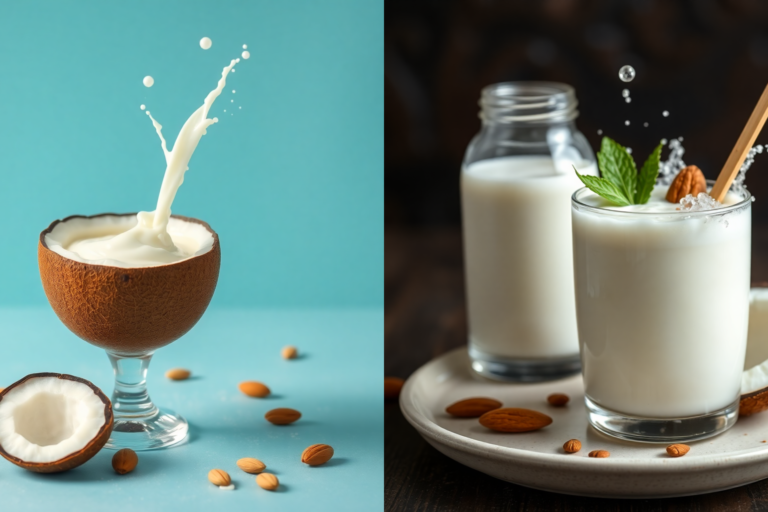Introduction: The Rising Popularity of Plant-Based Milks Coconut Milk vs Almond Milk
In recent years, the popularity of plant-based milks has surged, transforming how consumers approach dairy alternatives. With a growing awareness of health, sustainability, and dietary preferences, many people are opting for plant-based options like coconut milk and almond milk. These alternatives not only cater to lactose intolerance and dairy allergies but also appeal to those adopting vegan or vegetarian lifestyles. As more individuals explore the benefits of incorporating plant-based milks into their diets, it’s essential to understand the differences between these two popular choices: Coconut Milk vs Almond Milk.
Despite their rising fame, Coconut Milk vs Almond Milk is often surrounded by misconceptions. One common myth is that coconut milk is overly high in calories and saturated fat, leading people to shy away from its rich, creamy texture. In reality, when consumed in moderation, coconut milk can offer health benefits due to its unique fat composition. On the other hand, almond milk is frequently seen as the healthier option due to its lower calorie content, but this perception overlooks some of its limitations, such as lower protein levels compared to dairy milk.
Another myth that persists is the belief that both coconut milk and almond milk lack essential nutrients. However, many brands fortify these plant-based milks with vitamins and minerals, making them comparable to traditional dairy options. As we delve deeper into the discussion of Coconut Milk vs Almond Milk, it becomes clear that both have their unique benefits and drawbacks, making it crucial for consumers to evaluate their nutritional needs and preferences when choosing between these two delicious alternatives.
In this blog, we’ll unravel the truths behind these common myths, compare the nutritional profiles of Coconut Milk vs Almond Milk, and help you make informed choices for your dietary needs.
Myth 1: Coconut Milk is Unhealthy Due to High Fat Content
Busted: Understanding the Fats in Coconut Milk
One of the most common misconceptions about coconut milk is that it is unhealthy because of its high fat content. However, it’s important to recognize that not all fats are created equal. Coconut milk is rich in medium-chain triglycerides (MCTs), a type of fat that is metabolized differently than long-chain fatty acids found in many other foods.
MCTs are quickly absorbed by the body and used as a source of immediate energy, rather than being stored as fat. This means that incorporating coconut milk into your diet may not lead to weight gain like other high-fat foods. In fact, studies suggest that MCTs can even support weight loss by increasing feelings of fullness and enhancing metabolic rate.
When considering Coconut Milk vs Almond Milk, it’s worth noting that almond milk has significantly lower fat content, primarily consisting of polyunsaturated fats. While these fats are beneficial in moderation, they don’t provide the same rapid energy boost as MCTs. This makes coconut milk a unique option for those looking to include healthy fats in their diet.
Insight: Moderation is Key for a Healthy Diet
While it’s true that coconut milk has a higher fat content compared to almond milk, the key takeaway is that moderate consumption can be part of a healthy, balanced diet. Coconut milk provides not only MCTs but also essential nutrients like vitamins C, E, and several B vitamins, along with minerals such as magnesium, potassium, and iron. These nutrients contribute to overall health, supporting everything from immune function to skin health.
In moderation, coconut milk can be a delicious and nutritious addition to your meals. Whether you’re blending it into smoothies, using it in cooking, or adding it to coffee, the benefits of coconut milk far outweigh the myth of it being unhealthy.
In contrast, while almond milk is lower in calories and fat, it may lack some of the nutrients found in coconut milk. For those looking to add more variety and richness to their diets, coconut milk provides a compelling case for inclusion.
Myth 2: Almond Milk is Always Low in Calories
Busted: The Truth About Almond Milk Calories
Many people assume that almond milk is always low in calories, making it a guilt-free alternative to dairy milk. However, this myth deserves a closer look. The calorie content of almond milk can vary significantly based on the type you choose. For instance, sweetened and flavored varieties often contain added sugars, which can increase their calorie counts substantially. In contrast, unsweetened almond milk typically has fewer calories, making it a better choice for those watching their intake.
When comparing Coconut Milk vs Almond Milk, it’s crucial to understand that both options can have varying calorie levels based on their formulation. For instance, full-fat coconut milk is higher in calories than both unsweetened and sweetened almond milk, while light coconut milk can offer a lower-calorie alternative.
Insight: The Importance of Checking Labels
To make informed dietary choices, always check the labels on almond milk products. The nutritional information can provide insight into the calories, sugars, and other ingredients present. Unsweetened almond milk generally contains around 30-40 calories per cup, whereas sweetened varieties can have upwards of 60-90 calories or more. This distinction is essential, especially when considering your overall caloric intake.
In the ongoing discussion of Coconut Milk vs Almond Milk, it’s important to note that unsweetened almond milk typically contains fewer calories than full-fat coconut milk. However, if you’re opting for low-calorie versions of coconut milk, be aware that they might also have added ingredients that could alter their health benefits.
In conclusion, while almond milk can be a lower-calorie alternative, it’s not always the case. Always read labels and be mindful of what you choose. This way, you can enjoy the benefits of both Coconut Milk vs Almond Milk while staying aligned with your health goals.
Myth 3: Coconut Milk vs Almond Milk are Nutritionally Equivalent
Busted: A Closer Look at Their Nutritional Profiles
When it comes to non-dairy milk alternatives, many people assume that coconut milk and almond milk are nutritionally equivalent. However, a closer examination reveals significant differences in their nutrient compositions, making the comparison of Coconut Milk vs Almond Milk essential for informed dietary choices.
Comparative Nutritional Profiles
Let’s break down the key nutritional aspects of Coconut Milk vs Almond Milk:
Calories
- Coconut Milk: Typically, one cup of canned coconut milk contains around 550 calories, largely due to its high-fat content.
- Almond Milk: In contrast, unsweetened almond milk contains only about 30-40 calories per cup, making it a lower-calorie option.
Fat Content
- Coconut Milk: It is rich in saturated fats, primarily medium-chain triglycerides (MCTs), which can be beneficial for energy and metabolism.
- Almond Milk: This milk alternative is low in fat, with about 2.5 grams per cup, primarily coming from healthy unsaturated fats.
Protein
- Coconut Milk: Offers minimal protein, with about 5 grams per cup, mostly from the coconut’s natural content.
- Almond Milk: Provides approximately 1 gram of protein per cup, making it less protein-dense than coconut milk.
Vitamins and Minerals
- Coconut Milk: It is a good source of several minerals, including manganese and copper, while also offering small amounts of potassium.
- Almond Milk: Often fortified with vitamins like calcium, vitamin D, and vitamin E, almond milk can provide important nutrients for bone health and immune support.
Insight: Understanding Their Unique Nutrient Compositions
The distinct nutritional profiles of Coconut Milk vs Almond Milk cater to different dietary needs.
Coconut Milk is ideal for those seeking higher calorie content and healthy fats, making it suitable for ketogenic diets or those looking to increase energy levels. Its creamy texture also enhances the flavor of smoothies, soups, and desserts.
Almond Milk, with its low calorie and fat content, appeals to those focused on weight management or seeking a lighter alternative. It’s particularly favored in vegan and low-carb diets due to its versatility in various recipes.
Myth 4: Coconut Milk is Only for Desserts
Busted: The Versatility of Coconut Milk
When you think of coconut milk, sweet treats like creamy desserts and tropical smoothies might come to mind. However, this myth overlooks the incredible versatility of coconut milk in savory dishes, beverages, and soups. Let’s explore how coconut milk can elevate your culinary creations beyond just desserts.
Savory Dishes: A Culinary Game Changer
Coconut milk is an excellent ingredient for a variety of savory recipes. Its rich, creamy texture enhances curries, stews, and sauces, providing a unique flavor profile that complements spices beautifully. For instance, a Thai red curry made with coconut milk is a perfect blend of heat and sweetness, while coconut milk-based soups, like Tom Kha Gai, offer a delightful balance of flavors.
In comparing Coconut Milk vs Almond Milk, it’s essential to note that coconut milk adds a thicker, creamier consistency to savory dishes that almond milk simply cannot replicate. Almond milk may work in some recipes, but when it comes to rich, flavorful curries or hearty soups, coconut milk stands out as the preferred choice.
Beverages Beyond Desserts
Coconut milk isn’t just for desserts; it’s also an excellent base for a variety of beverages. You can create delicious, creamy smoothies by blending coconut milk with fruits and greens, or craft tropical cocktails that transport you to a sunny beach. The richness of coconut milk enhances the overall taste and texture, making it a superb alternative to almond milk in drinks that call for creaminess.
When considering Coconut Milk vs Almond Milk in beverages, coconut milk provides a distinct flavor and mouthfeel that almond milk lacks. This versatility means you can use coconut milk to create everything from refreshing smoothies to indulgent milkshakes.
Soups: Creamy Comfort in a Bowl
Coconut milk is also a fantastic addition to soups. Its natural sweetness and creamy texture can transform a simple broth into a luxurious meal. Try incorporating coconut milk into a pumpkin soup or a coconut-based chowder for a comforting dish that is both satisfying and nourishing. Again, when comparing Coconut Milk vs Almond Milk for soups, coconut milk is the clear winner for achieving that rich, creamy consistency.
Encouragement to Experiment
The key takeaway is to encourage experimentation with coconut milk beyond just sweet recipes. Embrace its versatility in your kitchen and explore the myriad of savory dishes that can benefit from its unique flavor and creamy texture.
In summary, the idea that coconut milk is solely for desserts is a myth worth busting. From savory curries and flavorful soups to refreshing beverages, coconut milk deserves a prominent place in your culinary repertoire. So, the next time you reach for a carton, consider how coconut milk can enhance your meals beyond the dessert table.
Myth 5: Almond Milk Doesn’t Provide Any Protein
Busted: Understanding the Protein Content of Almond Milk
One of the common misconceptions surrounding almond milk is that it doesn’t provide any protein at all. While it’s true that almond milk is lower in protein compared to cow’s milk, it still contains some protein. An average serving of unsweetened almond milk typically contains about 1 gram of protein, which is significantly lower than the approximately 8 grams found in an equivalent serving of cow’s milk. However, this doesn’t mean that almond milk should be dismissed entirely from your diet, especially when considering alternatives like Coconut Milk vs Almond Milk.
Insight: Enhancing Protein Content in Almond Milk
For those looking to increase their protein intake, fortified almond milk options are readily available on the market. Many brands enhance their almond milk with additional protein sources, such as pea protein or soy protein, allowing you to enjoy the benefits of almond milk while still meeting your protein needs. These fortified versions often contain around 5 to 8 grams of protein per serving, making them a more comparable option to dairy milk and a great choice for those considering Coconut Milk vs Almond Milk.
Moreover, fortified almond milk can offer other nutrients, such as calcium and vitamin D, making it a well-rounded option for those who might be lactose intolerant or following a vegan diet. When comparing Coconut Milk vs Almond Milk, it’s important to consider not just protein content but also the nutritional benefits of each type of milk.
The Protein Debate: Coconut Milk vs Almond Milk
While almond milk does provide some protein, coconut milk is often celebrated for its rich, creamy texture and healthy fats, but it typically contains little to no protein. This makes almond milk a better choice for those specifically seeking to boost their protein intake. Therefore, when considering Coconut Milk vs Almond Milk, the decision may come down to your specific dietary needs. If protein is a priority, opting for fortified almond milk can help you achieve your nutritional goals without sacrificing taste or versatility.
Incorporating almond milk, especially the fortified varieties, into your daily routine can be a simple way to add flavor and nutritional value to your meals. Use it in smoothies, cereal, or coffee as a dairy alternative, and enjoy the myriad of health benefits it offers.
Conclusion: Debunking Myths About Coconut Milk vs Almond Milk
In our exploration of Coconut Milk vs Almond Milk, we’ve debunked several common myths that often cloud the choices consumers face. One prevalent myth is that almond milk is always healthier than coconut milk. While almond milk is lower in calories, coconut milk is rich in healthy fats, particularly medium-chain triglycerides (MCTs), which can provide quick energy and support metabolic health. This illustrates that the benefits of each option depend on individual dietary needs and preferences.
Another misconception is that coconut milk is unsuitable for those watching their cholesterol levels. In fact, the fats in coconut milk are considered heart-healthy when consumed in moderation. On the other hand, some people worry that almond milk lacks sufficient protein. While it’s true that almond milk has less protein compared to dairy, it can still be part of a balanced diet when combined with other protein sources.
When considering Coconut Milk vs Almond Milk, it’s essential to evaluate your nutritional needs. For those seeking a creamy, rich texture, coconut milk can elevate dishes like curries and desserts, while almond milk offers a lighter, nutty flavor that pairs well with smoothies and cereals.
In summary, both coconut milk and almond milk can be nutritious choices, but the best option ultimately depends on your specific health goals and taste preferences. By understanding the unique benefits of each, you can make informed decisions that align with your dietary lifestyle. Whether you lean towards the creamy richness of coconut milk or the lightness of almond milk, embracing these alternatives can enhance your meals and support your overall well-being.











